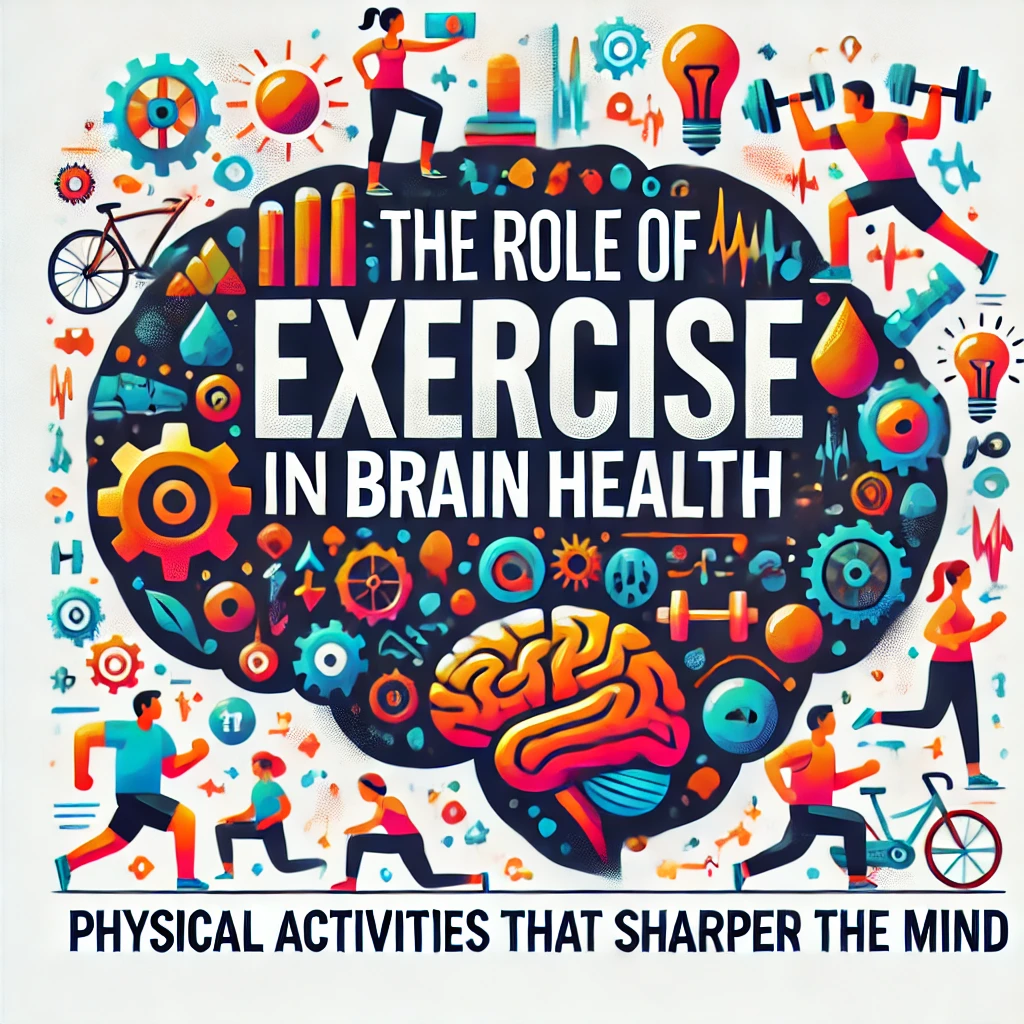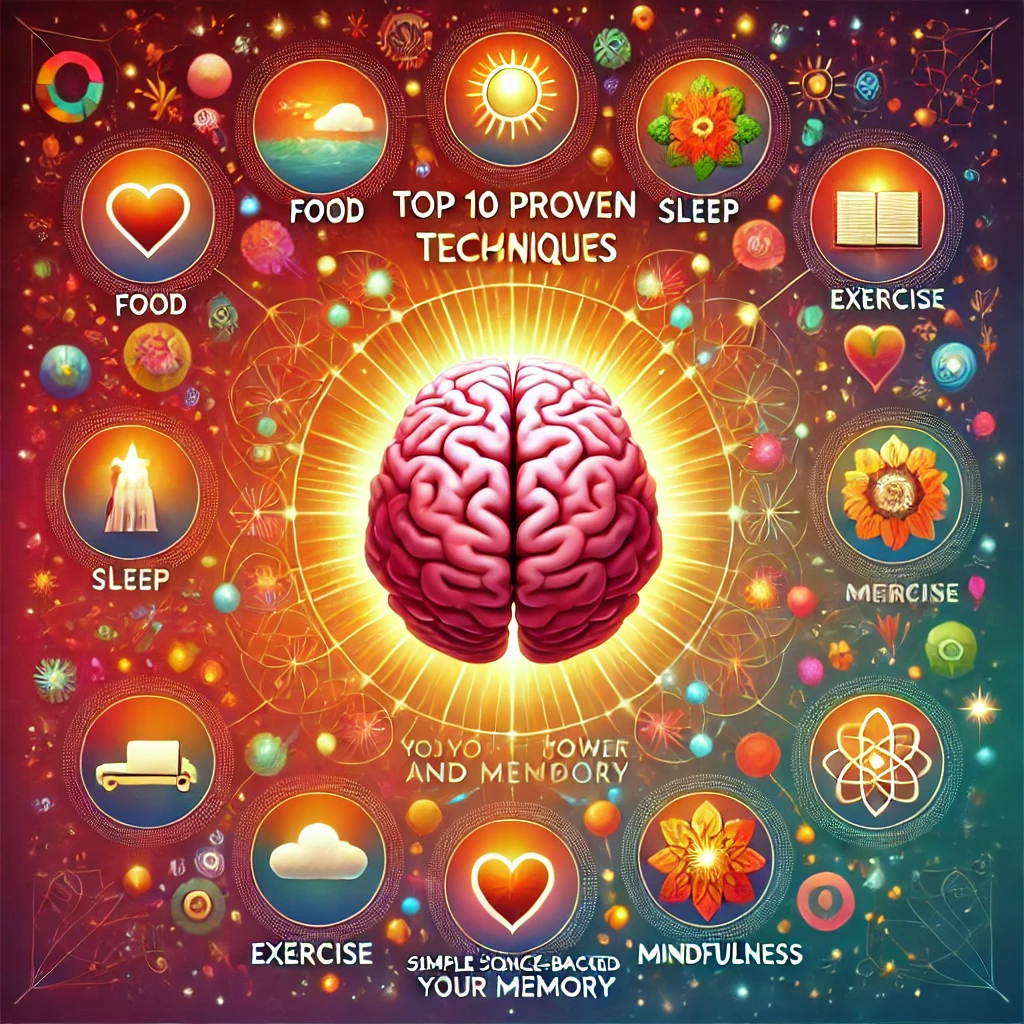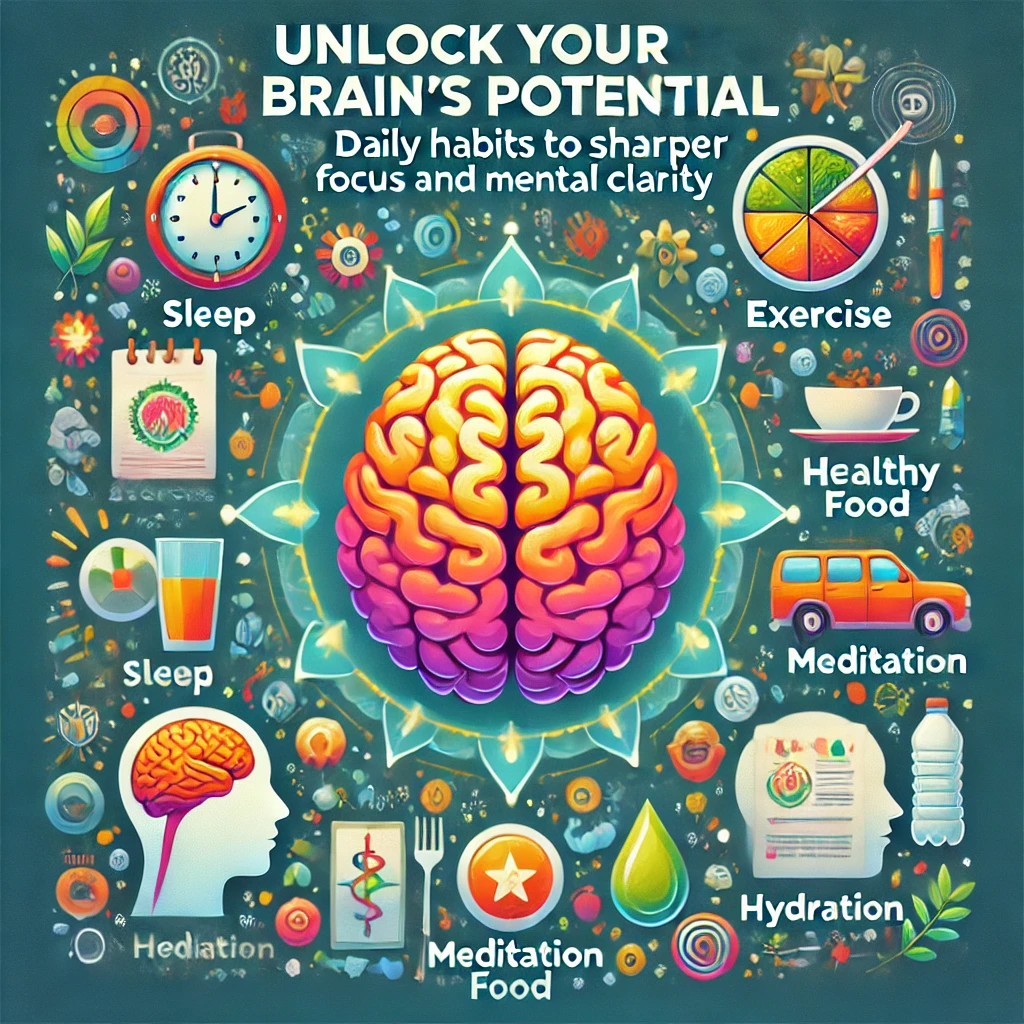Introduction
Exercise is often praised for its physical benefits, like improved cardiovascular health, muscle strength, and endurance. But what many people don’t realize is how powerful exercise can be for brain health. Physical activities do more than keep us fit—they also improve cognitive function, boost memory, and even sharpen mental clarity. Research shows that staying active isn’t just about keeping your body in shape; it’s also one of the best things you can do to keep your mind sharp.
In this article, we’ll explore the role of exercise in brain health, explain how different types of physical activities benefit brain performance, and provide practical tips for incorporating brain-boosting exercises into your routine. Whether you’re looking to improve focus, boost memory, or simply stay mentally agile, regular exercise can play a crucial role in achieving those goals.
1. The Science Behind Exercise and Brain Health
When you exercise, you’re not just working out your muscles; you’re also giving your brain a workout. Exercise increases blood flow, bringing oxygen and nutrients to the brain and helping it perform optimally. Physical activity also promotes the release of brain-derived neurotrophic factor (BDNF), a protein that supports neuron growth, improves brain cell health, and helps with learning and memory.
How exercise benefits brain performance:
- Increases blood flow to the brain: This improves oxygen levels and delivers essential nutrients that help maintain cognitive health.
- Promotes neuroplasticity: Exercise encourages the formation of new neural connections, enhancing the brain’s ability to adapt, learn, and retain information.
- Reduces stress and anxiety: Physical activity reduces cortisol levels, the hormone responsible for stress, and releases endorphins that improve mood.
Relatable anecdote:
A friend of mine used to feel mentally exhausted after long workdays. She decided to start a daily running routine, and within a few weeks, she noticed she was more focused, had better memory, and could think more clearly. Exercise had become her go-to tool for mental refreshment.
2. Best Exercises for Mental Clarity and Focus
Not all exercises have the same impact on cognitive function. While any physical activity is beneficial, certain exercises are particularly effective in promoting mental clarity and focus. Aerobic exercises, strength training, and even mindfulness-based exercises like yoga can have profound effects on the brain.
a) Aerobic Exercise
Aerobic exercise, like jogging, swimming, or cycling, is one of the best ways to boost brain power with exercise. It increases heart rate, pumps more blood to the brain, and releases chemicals that improve memory and attention span.
Example:
I started doing a brisk 30-minute walk every morning, and I noticed that it helped me stay alert and focused throughout the day. Aerobic exercise really does feel like a “reset” button for the mind.
Tips for getting started:
- Aim for at least 150 minutes of moderate aerobic exercise each week.
- Find an activity you enjoy—whether it’s dancing, swimming, or cycling—to stay motivated.
- Consistency is key, so even 10-15 minutes daily can make a difference.
b) Strength Training
Strength training isn’t just for building muscles; it’s also beneficial for the brain. Studies show that lifting weights can improve memory, focus, and mental clarity by promoting the release of growth factors that support brain cell health.
Why strength training is beneficial:
- Improves cognitive flexibility: Strength training challenges the brain’s ability to switch between tasks and improve mental resilience.
- Enhances mood and reduces stress: Lifting weights boosts endorphin levels, which support a positive mood and clear thinking.
Relatable anecdote:
I recently started incorporating weight training into my routine, and I found that it helped me feel more mentally grounded and energized. It’s amazing how lifting weights can provide both physical and mental strength!
How to incorporate strength training:
- Start with bodyweight exercises like squats, push-ups, or lunges if you’re new to strength training.
- Aim to strength train 2-3 times a week for optimal benefits.
- Gradually increase weights or resistance as you get comfortable, focusing on form to avoid injury.
c) Yoga and Mindfulness-Based Exercises
Yoga combines physical movement with mindfulness, creating a unique blend that supports both body and brain health. Yoga is effective in reducing stress, enhancing focus, and improving memory by helping the brain to stay calm and centered.
How yoga benefits cognitive health:
- Promotes relaxation: Yoga reduces cortisol levels, helping to lower stress and promote mental clarity.
- Enhances attention and concentration: Certain yoga poses stimulate blood flow to the brain, which improves focus and mental clarity.
- Boosts memory: The meditative aspect of yoga encourages mindfulness, which can strengthen memory and cognitive function.
Relatable anecdote:
I used to struggle with stress until a friend recommended yoga. Practicing a few minutes of yoga daily made a noticeable difference in my focus and emotional resilience. It felt like I had finally found an exercise that was as good for my brain as it was for my body.
Tips for practicing yoga:
- Try to practice yoga for at least 10-15 minutes daily. Even short sessions can provide mental benefits.
- Incorporate deep breathing exercises to calm the mind and improve focus.
- Explore different types of yoga, like Hatha or Vinyasa, to find what works best for you.
3. Physical Fitness and Brain Health: Why Consistency Matters
Staying consistent with physical activity is essential for long-term brain health. Just like any other muscle, the brain benefits from regular exercise. Studies show that people who maintain a steady exercise routine have a reduced risk of cognitive decline as they age.
The role of physical activity in mental performance:
- Supports long-term cognitive health: Regular exercise can reduce the risk of conditions like dementia and Alzheimer’s by keeping the brain healthy and resilient.
- Builds mental resilience: Consistent exercise improves stress management, allowing the brain to bounce back from challenges more easily.
- Boosts neurogenesis: Exercise encourages the formation of new brain cells, which supports learning and memory.
Example:
A family member of mine, now in his 70s, has been walking daily for decades. He’s sharp as ever, recalling details and stories from years ago. It’s clear that his commitment to regular exercise has supported his cognitive health over the years.
How to stay consistent:
- Set a regular schedule for exercise and treat it as a non-negotiable part of your day.
- Find activities you enjoy to keep motivation high, like group fitness classes or nature walks.
- Track your progress to see how your fitness improves, which can keep you motivated.
4. Exercise and Cognitive Health Connection: Understanding the Benefits for Memory and Learning
Exercise doesn’t just keep us fit; it also plays a key role in memory and learning. Physical activity stimulates the hippocampus, the area of the brain associated with memory and learning. Research shows that even moderate exercise can improve memory recall and enhance the ability to learn new skills.
How exercise improves memory and learning:
- Increases hippocampal volume: Exercise promotes growth in the hippocampus, improving memory and learning capacity.
- Enhances neuroplasticity: Physical activity increases the brain’s ability to form new connections, making learning and memory recall easier.
- Reduces mental fatigue: Exercise reduces feelings of fatigue, which can make it easier to stay focused and absorb new information.
Relatable anecdote:
I used to get tired quickly when studying, but after adding regular exercise to my schedule, I found that I could retain information better. It turns out that working out was giving my brain the stamina boost it needed to stay focused.
Exercise tips for memory improvement:
- Include a mix of aerobic and strength exercises in your routine to target multiple aspects of brain health.
- Take breaks to move while studying or working on complex tasks; short exercise sessions can improve retention and focus.
- Try incorporating outdoor activities to combine the benefits of exercise with fresh air and nature, which can further enhance mental clarity.
5. Activities to Sharpen the Mind: Practical Tips and Ideas
If you’re looking to sharpen your mind, specific physical activities can help you achieve this. From complex movements that engage both sides of the brain to exercises that combine mental and physical challenges, here are some brain-boosting exercises for cognitive function.
a) Dance Classes
Dancing combines physical movement with mental coordination, challenging the brain to remember steps, follow rhythm, and stay focused. It’s a fun and social way to exercise that provides a serious mental workout.
Benefits of dancing for the brain:
- Improves memory and attention as you learn and remember dance steps.
- Increases mental flexibility by challenging the brain to adapt to different rhythms and movements.
- Boosts mood and reduces stress, creating a positive environment for brain health.
Tips for getting started:
Join a dance class or try online tutorials if you’re new to dancing. Choose a style that interests you, whether it’s salsa, hip-hop, or ballroom, and aim to dance a few times a week.
b) Walking or Running Outdoors
Outdoor activities provide a double benefit by combining physical exercise with the mental benefits of nature exposure. Walking or running in nature has been shown to reduce stress and improve mental clarity, offering a mental reset that promotes brain health.
Why walking and running are brain boosters:
- Promotes relaxation and reduces stress, which can improve memory and focus.
- Encourages creativity and problem-solving, as moving outdoors provides a refreshing change in perspective.
- Supports cardiovascular health, which is linked to improved brain function.
Example:
After
a stressful day, I like to take a walk in a nearby park. By the time I get back, I feel clear-headed and recharged. The combination of exercise and nature is the perfect remedy for mental clarity.
How to incorporate outdoor exercise:
- Try to take at least one outdoor walk each day, even if it’s a short one.
- Take advantage of parks or trails in your area to enjoy nature while you exercise.
- Use walking or running as an opportunity to unplug from screens and give your brain a break.
6. Consistency is Key: Building an Exercise Routine for Brain Health
The best way to experience the benefits of exercise for brain health is to make it a regular part of your life. It’s consistency that allows these benefits to accumulate and provides long-term support for cognitive function and mental performance.
Tips for building a lasting exercise routine:
- Start small: Begin with manageable workouts and gradually increase the intensity.
- Set specific goals: Define what you want to achieve, like improved focus or reduced stress, to stay motivated.
- Track your progress: Use a fitness app or journal to track improvements, which can reinforce your commitment.
Conclusion
Exercise isn’t just for physical fitness—it’s also one of the best ways to maintain and enhance brain health. By incorporating regular physical activities like aerobic exercise, strength training, yoga, or even dancing, you can sharpen your mind, boost cognitive performance, and improve memory. Consistency is key, so find activities you enjoy and make exercise a part of your daily routine.
Whether you’re a beginner or a fitness enthusiast, the connection between physical fitness and brain health is one that everyone can benefit from. Start small, stay consistent, and watch as your brain thrives with each step, lift, or stretch you take.
FAQ Section
1. How does exercise benefit brain health?
Exercise boosts blood flow to the brain, releases BDNF, and reduces stress, all of which support cognitive function, memory, and mental clarity.
2. What types of exercise are best for mental clarity?
Aerobic exercises, strength training, and yoga are all beneficial for mental clarity, each providing unique benefits for brain health.
3. Can physical activity really improve memory?
Yes, regular physical activity increases hippocampal volume and promotes neuroplasticity, both of which enhance memory.
4. How often should I exercise to support brain health?
Aim for at least 150 minutes of moderate exercise each week, incorporating a mix of cardio, strength training, and flexibility exercises.
5. Can exercise reduce stress and improve focus?
Yes, exercise releases endorphins that reduce stress and improve focus, creating a positive impact on mental performance.
6. What are the benefits of outdoor activities for the brain?
Outdoor activities combine the benefits of exercise with nature exposure, reducing stress, improving mood, and enhancing mental clarity.
7. How does yoga help with brain health?
Yoga reduces cortisol, increases focus, and encourages relaxation, all of which support brain health and cognitive performance.
8. Are there specific exercises that improve creativity?
Activities like walking, running, and dancing can boost creativity by refreshing the mind and providing new perspectives.
9. Can exercise protect against cognitive decline?
Yes, regular exercise reduces the risk of cognitive decline by promoting brain health, improving blood flow, and supporting long-term memory function.



